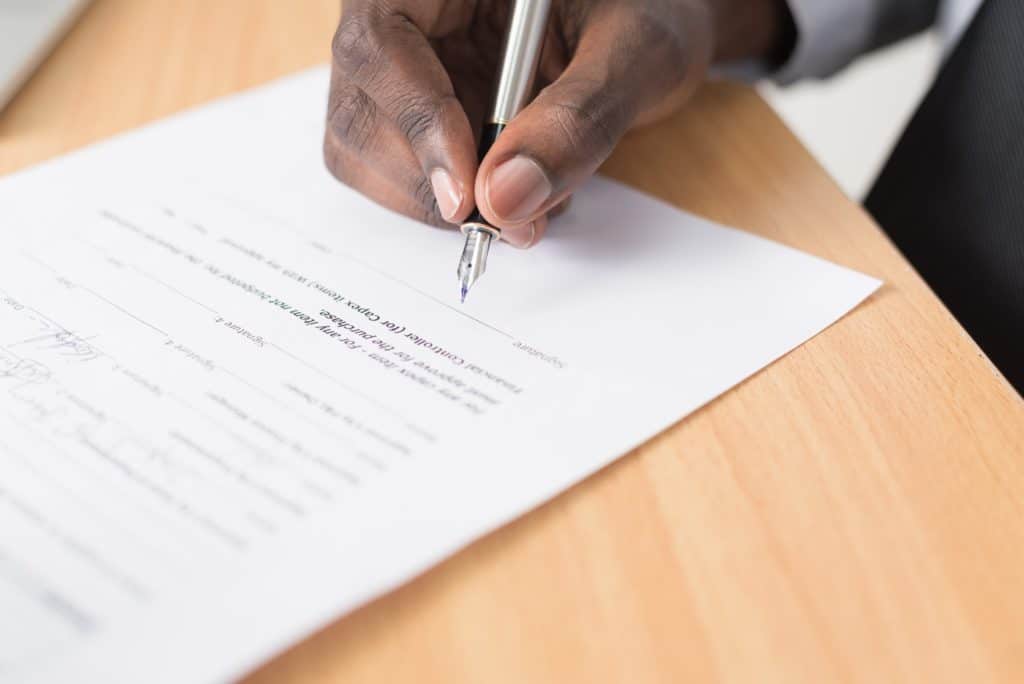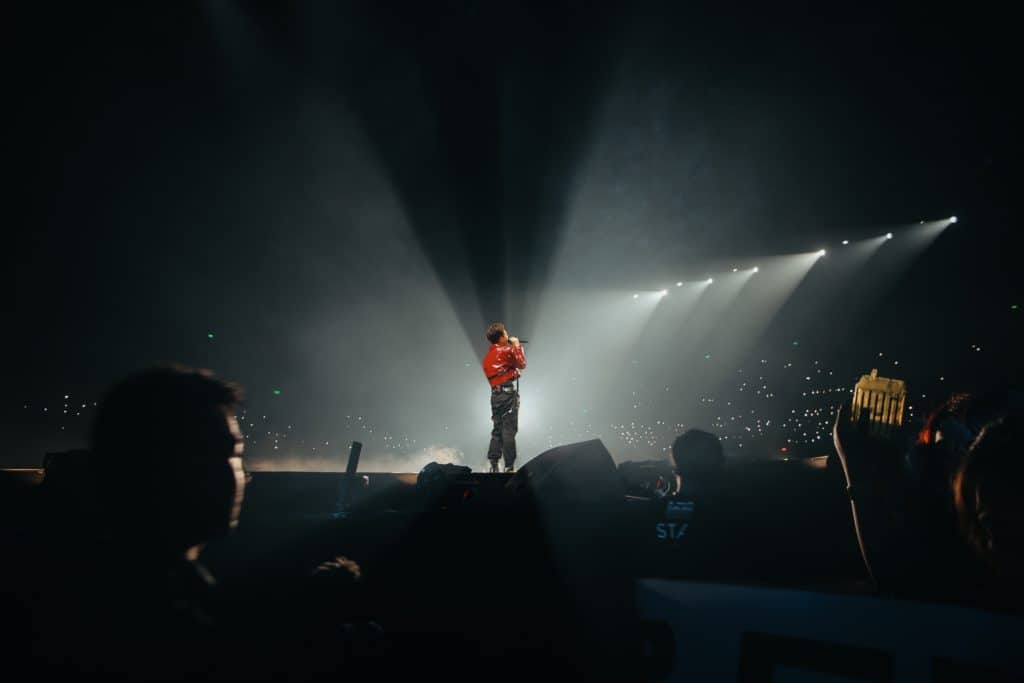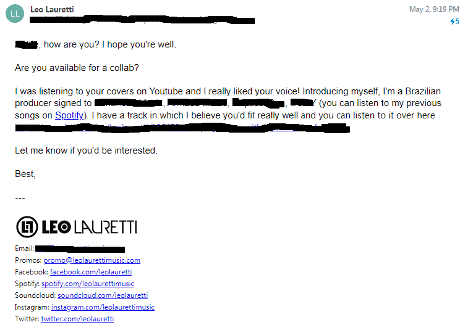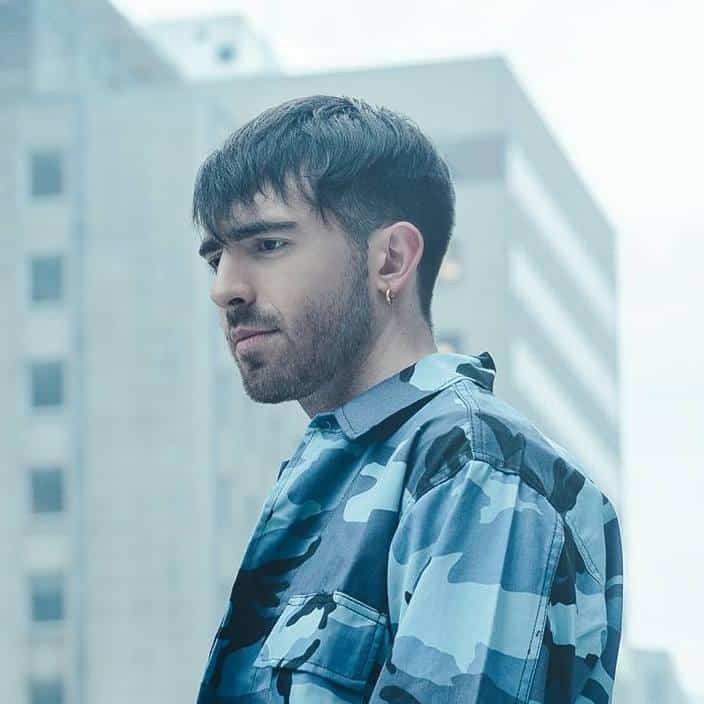Today, I’m going to talk about finding vocalists and how you should approach them. It was a topic requested by one of the subscribers of my newsletter (feel free to suggest any topic), and I felt it was a topic worth discussing. In this post, you’ll learn a bit more about how to approach them, where you approach them, and my way to approach vocalists.

This is what we’re covering today in this post:
- My Way of Finding Vocalists
- Characteristics to Look For?
- How Do I Approach Artists?
- Tools That Can Help You
- What Happens After the YES?
- Terms Are Worked Out, What’s Next?
- My Desired Workflow:
- Listen to the PROs – Interview with Brandon Mignacca
How to Find Good Vocalists
There are many ways to find good vocalists, and we often overcomplicate what is simple.
I normally seek them on Youtube, looking for covers of tracks that have the characteristics that I would like for a trance song. For example, Halsey – Without Me is one song that I look for. Why? Because in it vocalists have to sing in a gentler voice during the verse, but also be more energetic during the chorus, which are traits I look for verses (gentler) and choruses (energetic). Listen to it below:
Other songs I like are Halsey – Sorry, Chris Isaak – Wicked Games, and if you notice, they all follow the gentle and energetic pattern I look for. Look at this version of Wicked Game by Gemma Hayes, who’s also the singer from Counting Down The Days – Above & Beyond Feat. Gemma Hayes and how she’s able to push the vocals during the chorus while also keeping it gentler during the verse.
The game completely changes when I’m trying to look for vocalists for my house project. In this situation, I want vocalists with a soulful voice and normally not an ethereal voice that I’d want for a trance song. Now, vocalists need to have an urgency in their voice, which is something that house vocals have. Examples of songs I look for when looking for house covers are:
Amy Winehouse – Stronger Than Me:
Al Green – Let’s Stay Together:
Can you see how the vocals now have a lot more soul in them, but also being a bit more ‘shot’.
Therefore, when trying to find your vocals, first understand what you’re looking for and the kinds of vocals that you’re looking for. Then, look for songs from famous artists that have the kind of vocals that you like and after you find these songs, start looking for their covers and vocalists.
Other Methods to find Vocalists
- Friends of Friends: One of the vocalists that I’ve worked with, Giovanna Bianchi, is a great friend of my manager; Another one I’m talking to is a friend of a friend from his college. Kepik, producer friend of mine, found Molly Marrs for his song Prism Heart by being friends with Molly’s boyfriend. Just ask, and someone might appear.
- Producer/Musician matching websites: Sites like Soundbetter.com offer you the possibility to connect with other vocalists from a vast array of genres and levels. For example, check out the amount of vocalists you can find on https://soundbetter.com/s/singer-female. You can check vocalists also on fiverr.com, vocalizr.com, and many others.
- Splice: Although you’re not finding an actual vocalist, you can find many royalty free vocals on Splice to use on your songs. I’ve seen a lot of friends use, and I include myself, samples from Karra’s Vocal Pack V2. The problem with Splice vocals is that a lot of them have been widely used, like this song from Kream called Take Control:
Characteristics to Look For?
Vocal Tones
This is the most important thing, in my opinion!
Imagine you’re looking for someone like Elvis Presley, and you find a singer like Aretha Franklyn. They are both amazing singers, but one might not be right for what you’re looking for. Therefore, be sure of the kind of vocal you want (sweet, deep, soft) and the intensity of the vocal you want (gentler, energetic, both, neither) before start looking or you can later get frustrated with the vocal you got. I can’t stress enough how important this is.
Now, listen to Daniel Gidlund’s Wasteland and, again, how well he knows how to use his voice (and I’ve told him 100x times: he has an amazing voice). He’s the kind of vocalist that would work amazingly in a Swedish House Mafia vocal as he has a voice that reminds me of John Martin. In addition to that, listen to the songwriting:
Originality
The ability of the vocalist to reinterpret the song he/she is covering is something you should look for.
A person who sings the vocal exactly like how the original goes may show a lack of originality, which may affect them when interpreting and writing your songs later on. Therefore, when looking for vocalists, it’s always a plus when you find vocalists that have their own songs since you can then analyze the songwriting and melody of the song they’ve made. Of course, they have to be something you like, but it is something that could call your attention because it shows the artist is capable of being original and also translating what happens in their heads without running to a cover song’s structure.
If that’s not the case, listen to how they interpret the cover songs and try to find artists that can achieve in these covers what you want for your vocal. However, as said before, first you understand what you want and then you look for it, otherwise this can turn into an endless pursuit.
To illustrate, listen to Marty Longstaff’s Shipyards, who was featured on Flying by Candlelight – Above & Beyond, and listen to how he can use his voice in his song, which is probably what attracted A&B.
Business Deal
The second most important thing is a vocalist that fits the deal you’re looking for.
Sometimes you’ll find artists who would be willing to do a 50/50 split, which is good for starting producers since vocals could cost a lot, but sometimes you’ll want to maintain all the rights and want to pay the vocalist upfront. It’s all a matter of budget and how open you are to paying them in advance.

How big is the vocalist?
Another really important element, especially in the Youtube environment since artists with labels or millions of subscribers may not be looking for collaborations with smaller artists. Whenever I’m looking for vocalists on Youtube, I only look for vocalists with less than 100k plays on the desired song, sometimes even 50k.
Really big vocalists tend to be expensive, unreachable, and sometimes hard to work with due to busy schedules, but more available for you when you pay their fee. Smaller vocalists, however, can be more inexperienced and require more work from you, but can be cheaper or don’t even ask for an upfront fee. As said before, it’s all a matter of understanding your situation and what can you work with.

How Do I Approach Artists?
So, you’ve found the vocalist you want to work with, what’s next?
Now, you have to find a way to contact them, and the easiest, and most professional, way is to look for their email. Search on Instagram or Facebook for the email and try to reach out. If you don’t find anything, sending an Instagram message asking for their email can sometimes work as well, but I would always recommend email since it’s more professional and Instagram can be a bit intrusive.
After you find the email, I recommend you to be direct, but at the same time, explain where you’ve discovered her/him and who you are. Check the following email I sent a while ago:

So, we see a couple of sections on this email.
- Direct Question: You ask directly if they are availabe for the collab. Punch them first, and explain later.
- Intro & Compliment: After the punch, you explain who you are, the labels you’ve released at and why are you looking for them. Sometimes I even mention “I really liked your cover of song XXXX”. Make them feel appreciated!
- Link: Send the link of the track. Soundcloud preferably, but any streaming link works. Never attach a song.
- References: You could also include a “I want to do something like this”, and then you include a spotify link of your track or playlist of reference tracks for the vocal.
- Footer: All my socials listed and easy for the person to reach out and/or check my stats and who I am (PS. There is no way you can make your Spotify Artist Link personalised like that. That’s only a text with a hyperlink behind it)
Other Insights From the Email
Look at how I don’t talk about any deal upfront since this might drive people away. Make them listen and be interested in the track, so then they contact you and then you talk about the deal.
After you send this first email, I use a couple of tools that help me keep track of whether they’ve opened the email and/or clicked the links. If there are no responses after three days, I do a follow-up email and if there are no responses after the first two days, I move on to the next one.
Tools That Can Help You
My email client is called Polymail, and I use the PRO version of it because it offers two things that help me in these approaches: Email read receipts and link tracking. The idea is to keep track of what’s happening to your email after you’ve sent them since this could be a sign that things will, or not, work out, which means not waiting for something that might not happen. For example, after you’ve sent the email, track their activity inside your email and:
- If they read the email, clicked on the link, but didn’t respond right away, it’s already a bad sign.
- If after you follow-up there are no answers after the second read receipt, another bad sign.
Ps. It has happened that the person was busy and answered me two weeks later, but then you have an excuse to say “I’m sorry, but even after the follow up you didn’t answer, so I moved on.”. However, you can always answer with “Hey, but let’s work on this next one”
In any case, there are a bunch of companies that offer link tracking and read receipts, the most famous being Yesware and Hubspot Sales, which offer free versions, but I like Polymail because it gives some extra features that these two don’t have.
What Happens After the YES?
So, you’ve sent the email and she’s accepted it… now what? Well, now comes the most crucial part of the vocal workflow, which is discussing the terms and conditions for the vocal. I normally go for a 50/50 split of the royalties, but I’ve already paid some vocalists in advance.
I HIGHLY recommend you to discuss the terms before starting anything since you might end up with an amazing vocal, but with terms that appear out of a sudden and might ruin the collab, as has happened to me. Therefore, lock the terms of the collaboration right from the beginning to avoid surprises in the end

Terms Are Worked Out, What’s Next?
Now comes the songwriting part, and one important part of it is briefing the artist.
This part is optional, but I like to brief them with the topics I’d like them to talk about and some personal stories that I think might relate to the song. For example, when I did “Gravity” with Brandon Mignacca and NOAR, I told my situation to Brandon and Jose, and Brandon wrote the lyrics all around what I’ve said.
It was a tough moment for me and Gravity was a song I felt was my way of getting out of this tough period, and if you read the lyrics, all it talks about is this. To me, this was a crucial part of the track since it makes the track personal and, when this happens, other people relate to it as well, which means they will like the track a bit more.

The Desired Workflow:
If we sum up what we’ve discussed, this is the workflow that we have :
- Finding the right vocalist;
- Approach & Pitch;
- Terms and Conditions;
- Briefing;
- The vocalist starts to work;
Basically saying, after you’ve found an artist, contacted them, received their approval, came to an agreement with the terms of the deal, briefed the artist, you then wait for a couple of weeks, or days, for the vocal to be recorded. Then, comes the songwriting and recording part, which part of another post that I’ll write in the future.
In summary, she/he sends the first version and you tweak it until you’re 100% satisfied with it. After you settle, I would recommend asking for a final draft, which can be recorded with his/her phone, just to check if you need anything else. After approving that, I always send them a video explaining what I would like to receive, and this varies on whether I’ll have to mix the vocals or not (I have a standard video that I use where I say what kind of elements I’d like them to record). After sending this video, I let them know the date I’d love to have the vocal by and settle a date for the delivery, so expectations are aligned.
Although this is a standard workflow I like to follow, it varies from vocalist to vocalist. In any case, I always mention this to them before I brief them with my stories so they know what my expectations are. In addition, the final delivery date is also important so no one is anxious without the need to be.
Once you set a date that is agreed upon by both artist and vocalist, you can expect something by then since you both agreed on it. It can happen that they take more time, but then, since you’ve settled on something before, you can ask them more directly, but politely, when are they recording it. After you receive the final recording, that’s it and now it’s time to mix it in with the track, which I’ve covered in this post.
Listen to the PROs
Now, let’s do something different. I invited my friend and collab partner Brandon Mignacca to answer some questions for this part. Now, we’ll see what he say to us:

What do you consider when agreeing to collab with someone?
At the very beginning of the process, I try to look at the music and see if it is something I can imagine my voice on. If the track doesn’t speak to me, I do not want to waste the time of others as I would rather they find the voice that matches their style. It’s all about the quality and relationship between the track and its vocal, they have to make sense.
Secondary to this is pricing and the overall vibe of the producer. I would like for both of us to understand each other and their respective value as a musician this is why I try to emphasize my price at the beginning also as to not surprise the Producer afterward. Getting the crucial and delicate aspects of music out of the way allows us to both be honest and excited going into the music! Especially if the Producer shows a sense of honesty in his interactions with me during the whole process!
What contains in the perfect email pitch from a producer to a vocalist?
The perfect email pitch varies from producer to producer. I find that the ones I pick more often than not manage to incorporate everything into one message; an introduction, a purpose, the song in question (or previous tracks to emphasize the style) and a genuine honesty and sense of professionalism.
I personally disregard the typical “yo let’s do a track” without any relationship-building behind it. These are real people you are interacting with so treat them like so!
Anything you’ve gone through that you would not recommend artists to do when working with vocalists?
It’s happened a few times that after I sent them a demo of the track, they wanted their money back. Now, I never ask for all the money upfront. I do ask for a portion or half to pay for the time I spent recording, and brainstorming the melody/lyrics I come up with. I recommend against asking for that money back and find this to be disrespectful to a working musician in their profession. As a producer, you have to understand that not all vocals sent will match your track if you have a specific idea or vision in mind.
I have a few tips to emphasize that could increase the overall success of finding a perfect vocal and to use your money efficiently:
- Do your homework on the Vocalist. There are some vocalists who are super consistent with their sound and some who change their sound from track to track. Make sure to listen to their repertoire.
- If you have a very specific sound in mind, and the vocalist in question is able to write to your style, then introduce a lot of reference tracks that can give the vocalist a clearer idea of what you want.
- If you are encouraging a Vocalist’s to interpret the track then let him know and be open to what he introduces as an idea. In many cases, letting your ego aside to hear what someone can bring to your track is one of the best ways to diversify your track from others in your genre.
How much do the producer’s ideas and stories help you, or not, when writing the lyrics of the track? Would you recommend artists to brief the vocalists they are working with personal stories or do you prefer when they just give you a topic to write the lyrics?
That varies from track to track. I think as a Vocalist it’s our job to know what we bring whether it is consistency or diversity. I bring diversity into every song to make them as unique as possible, so having a better understanding of the producer’s intention or story can definitely impact how I will write for it. In some cases, I am left with complete freedom with what I write and that also is super enjoyable. As a producer, it is always a good idea to know your intention with the track prior to showing it off to a Vocalist. Whether it is a concept or a white card.
Now it’s your turn
I hope this vocalist series was enjoyable for you.
Now I’d like to hear what you have to say:
How do you like to find your vocalists? If you have a technique that I haven’t mentioned above, leave it on the comments section so other people can benefit from as well!